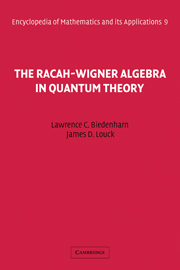Book contents
- Frontmatter
- Contents
- Contents of companion volume
- Editor's Statement
- Section Editor's Foreword
- Preface
- Acknowledgments
- Introduction by George W. Mackey
- The Racah–Wigner Algebra in Quantum Theory
- Chapter 1 Introduction
- Chapter 2 Algebraic Structures Associated with Wigner and Racah Operators
- Chapter 3 Null Space Properties and Structure Theorems for RW-Algebra
- Chapter 4 W-Algebra: An Algebra of Invariant Operators
- Chapter 5 Special Topics
- Appendix of Tables
- List of Symbols
- Author Index
- Subject Index
Section Editor's Foreword
Published online by Cambridge University Press: 05 June 2013
- Frontmatter
- Contents
- Contents of companion volume
- Editor's Statement
- Section Editor's Foreword
- Preface
- Acknowledgments
- Introduction by George W. Mackey
- The Racah–Wigner Algebra in Quantum Theory
- Chapter 1 Introduction
- Chapter 2 Algebraic Structures Associated with Wigner and Racah Operators
- Chapter 3 Null Space Properties and Structure Theorems for RW-Algebra
- Chapter 4 W-Algebra: An Algebra of Invariant Operators
- Chapter 5 Special Topics
- Appendix of Tables
- List of Symbols
- Author Index
- Subject Index
Summary
The study of the symmetries of physical systems remains one of the principal contemporary theoretical activities. These symmetries, which basically express the geometric structure of the physical system in question, must be clearly analyzed in order to understand the dynamical behavior of the system. The analysis of rotational symmetry, and the behavior of physical quantities under rotations, is the most common of such problems. Accordingly, every professional physicist must achieve a good working knowledge of the “theory of angular momentum.”
In addition, the theory of angular momentum is the prototype of continuous symmetry groups of many types now found useful in the classification of the internal symmetries of elementary particle physics. Much of the intuition and mathematical apparatus developed in the theory of angular momentum can be transferred with little change to such research problems of current interest.
If there is a single essential book in the arsenal of the physicist, it is a good book on the theory of angular momentum. I have worn out several earlier texts on this subject and have spent much time checking signs and Clebsch-Gordan coefficients. Such books are the most borrowed and least often returned. I look forward to a long association with the present fine work.
A good book on the theory of angular momentum needs to be thoroughly reliable yet must develop the material with insight and good taste in order to lay bare the elegant texture of the subject. Originality should not be erected in opposition to current practices and conventions if the text is to be truly useful.
- Type
- Chapter
- Information
- The Racah-Wigner Algebra in Quantum Theory , pp. xxi - xxiiPublisher: Cambridge University PressPrint publication year: 1984



